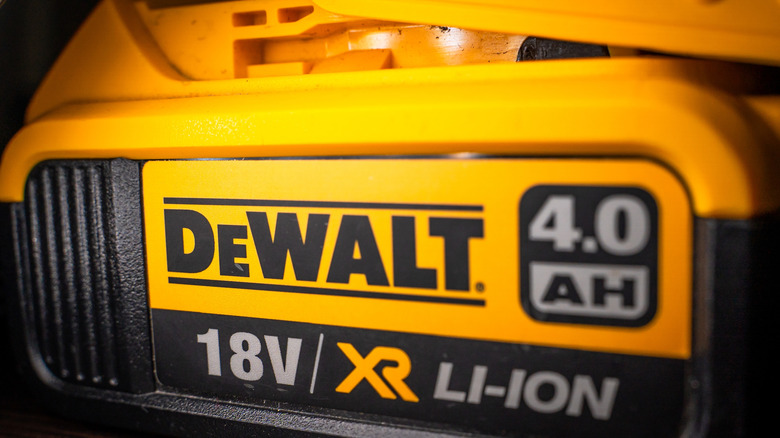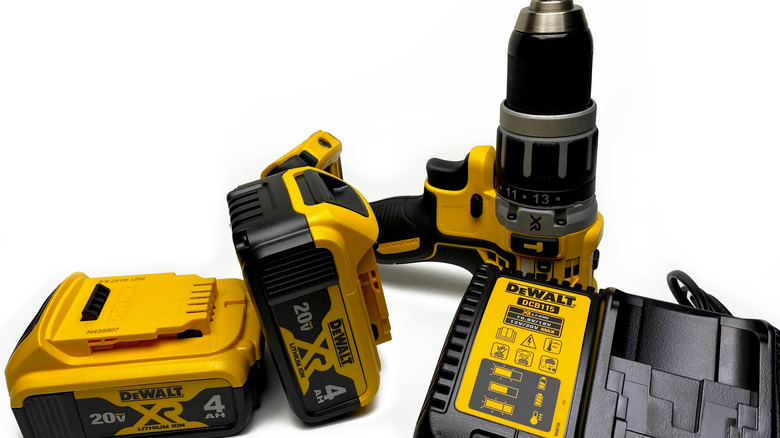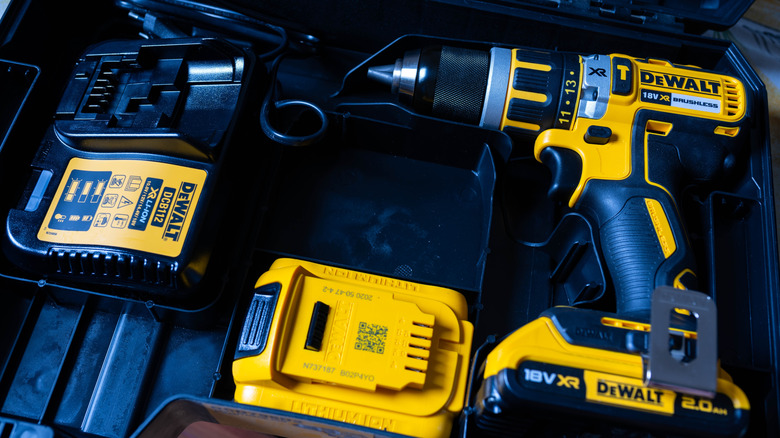Cold Weather Can Kill Your DeWalt Batteries - Here's How To Keep Them Safe
There's no denying that battery-powered tools are taking over workshops and job sites. Sure, they might have some limitations in terms of power output. But when you compare them to corded versions, they're ridiculously convenient to use and maintain. With that said, if you want a power tool brand you can count on, you can never go wrong with Dewalt. Since its establishment in 1924, Dewalt has become one of the most popular power tool brands in the U.S. After all, many people praise Dewalt for making durable tools suitable for everyone from construction pros to woodworking hobbyists.
Now that the weather is changing, odds are good that most of our DeWalt cordless power tools will end up in the garage or shed. But before you store your Dewalt cordless drill or lawn mower, it's important to remember that extreme temperatures and batteries don't mix. In fact, even for the most heavy-duty power tool battery, cold weather is the biggest hidden enemy, as it drastically reduces the battery's performance and lifespan. That's why, before you end up with a dead battery, you'll want to make sure that you store your Dewalt Batteries properly before things get frosty.
With that in mind, let's break down exactly how cold weather can kill your DeWalt batteries and what you can do to ensure that they survive the winter months.
How cold weather impacts DeWalt batteries
DeWalt PowerStack batteries might be among the best for power delivery, but they do have their limitations. For instance, they're not immune to some of the most common problems affecting power tool batteries. Plus, as you already know, they will have a hard time operating in extreme temperatures. But how do below-freezing temperatures affect these batteries?
Lithium-ion batteries — which are exclusively used in current Dewalt cordless tools — rely on a chemical reaction to operate. So, if you let them sit in a cold environment for an extended period, the reactions will slow down. In turn, this will result in your battery generating a weaker electrical current, meaning it will struggle to meet the power tool's demand. As a result, your cheap DeWalt power tools will either stop or lose torque mid-job.
Besides storing your batteries in a cold garage, charging them in freezing temperatures can also affect them. In fact, according to the DeWalt website, temperatures below 40°F can result in a permanent loss of runtime. After all, low temperatures will increase the internal cell resistance. And when you attempt to charge the batteries in that state, not only will they take a long time to charge, but you'll also damage them. That's why DeWalt always recommends charging its batteries within the 40°F-105°F range.
How to keep your DeWalt batteries safe in cold weather
If you live in an area with extreme cold, keeping your batteries within the 40°F-105°F range can be quite challenging. However, keeping your power tool batteries safe over winter is quite simple and quick if you know what to do. One simple hack that you can try is bringing your power tool batteries indoors and storing them in a cool, dry space (say, a cabinet or a closet) with a temperature range of 50°F to 75°F. You will also want to avoid storing your batteries in a cold garage or car overnight.
For long-term storage, consider storing your batteries in an insulated cooler. Well, it might sound weird, but a cooler can also serve as a hot box and keep your batteries warm during the cold months. However, if you plan to use this method, you must always keep an eye on the batteries, as they can overheat — a recipe for a fire hazard.
Additionally, if you're wrapping up a fall DIY project, you'll want to try to limit your tool use. Also, have a charged spare battery in hand and rotate them regularly. Don't forget to keep your batteries dry at all times. Moisture, condensation, and oil are all threats to your battery's health and can lead to internal corrosion or even short-circuiting. For added protection, you might consider using an insulated case or a battery blanket. They'll help maintain a more stable temperature when you are transporting the batteries between job sites.


